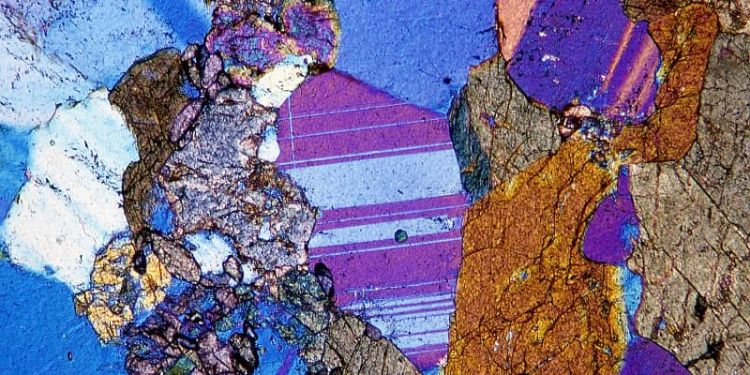Rocks, Melts and Fluids

We study processes in the solid Earth that affect the chemical composition of the interior of our planet. Our interdisciplinary research broadly falls across three themes:
- Geochemical mantle processes - Magmas are derived from the Earth’s mantle and are a key way in which elements are transported from the interior of the planet to the surface of the Earth. The diversity of magmas that we see at the Earth’s surface is the result of a complex interplay between both the source region of the magma in the mantle, and the subsequent evolution and contamination processes on the way to the surface. Conversely, when the Earth’s lithosphere – the upper rigid layer from which Earth’s tectonic plates are made – is returned into the deeper mantle via subduction zones, compositional variability is added back into the deeper Earth. This complex process of recycling material through Earth’s tectonic processes creates complex geochemical and isotopic signatures which can be used to trace the nature and origin of both crustal and mantle chemical reservoirs.
- Fluid-rock interaction - Fluids are essential for most mineral reactions. Reactions between rocks and fluids both change the fluid composition and lead to chemical and mechanical changes to rocks, affecting deformation processes and chemical transformations. A central part of the study of fluid-rock interactions is the recognition of distinctive textures generated by different fluid/melt-rock interaction processes. Examples include the formation and evolution of fluid and melt pathways in the crust, and their consequential rheological effects on rock strength. Application of our research includes both, natural and industrial examples and covers a broad range of temperatures such as melt propagation, ocean floor alteration, diagenetic processes, geothermal exploration, radioactive waste management and ore formation.
- Rates of Geological Processes – A repeated question regarding Earths’ geodynamic evolution is the rate of different geological processes over geological time. This topical theme takes advantage of experimental datasets and recently-developed analytical and numerical techniques to decipher the rates of geological processes such as metamorphic reactions, tectonic uplift and fluid migration. By combining focused field studies with microstructural analysis, petrological analysis, and PTX (pressure-temperature-composition) information with diffusion modelling, laboratory experiments and geochronology, the rates of geological processes can be estimated. Results are used to constrain important geodynamic scenarios including mountain building, rifting, oceanic crust formation and continental scale deformation.
We have strong collaborations with the Cohen Geochemistry group (Earth Surface Science Institute), the Petrophysics group in the Wolfson laboratory (Institute for Applied Geosciences) as well as links across the University with Material Sciences and Civil Engineering.
Further information
View all members of our research group, our recent projects and publications.
PhD projects
We have opportunities for prospective postgraduate researchers. Find out more.
Contact us
If you would like to discuss an area of research in more detail please contact the Research Group co-leaders, Jason Harvey and Dan Morgan

